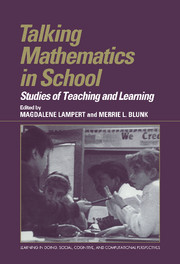Crossref Citations
This Book has been
cited by the following publications. This list is generated based on data provided by Crossref.
Renne, Christine G.
2001.
A Perspective on Achieving Equality in Mathematics for Fourth Grade Girls: A Special Case.
Curriculum Inquiry,
Vol. 31,
Issue. 2,
p.
163.
Billings, Laura
and
Fitzgerald, Jill
2002.
Dialogic Discussion and the Paideia Seminar.
American Educational Research Journal,
Vol. 39,
Issue. 4,
p.
907.
Kulikowich, Jonna M.
and
DeFranco, Thomas C.
2003.
Philosophy's Role in Characterizing the Nature of Educational Psychology and Mathematics.
Educational Psychologist,
Vol. 38,
Issue. 3,
p.
147.
Seeger, Falk
2003.
BOOK REVIEWS: A Large Territory: One Year in an Elementary Mathematics Classroom.
Mind, Culture, and Activity,
Vol. 10,
Issue. 2,
p.
168.
2004.
Erratum.
Journal of Curriculum Studies,
Vol. 36,
Issue. 3,
p.
401.
Frank, Carolyn R.
and
Uy, Frederick L.
2004.
Ethnography for Teacher Education.
Journal of Teacher Education,
Vol. 55,
Issue. 3,
p.
269.
ROSS, VICKI
2004.
A story of reform: Math, Science, Technology Investigations (MSI) in Room 34 at Bay Street Community School.
Journal of Curriculum Studies,
Vol. 36,
Issue. 5,
p.
587.
Baxter, Juliet A.
Woodward, John
and
Olson, Deborah
2005.
Writing in Mathematics: An Alternative Form of Communication for Academically Low–Achieving Students.
Learning Disabilities Research & Practice,
Vol. 20,
Issue. 2,
p.
119.
2005.
Book reviews.
British Educational Research Journal,
Vol. 31,
Issue. 6,
p.
787.
Stevens, Reed
Wineburg, Sam
Herrenkohl, Leslie Rupert
and
Bell, Philip
2005.
Comparative Understanding of School Subjects: Past, Present, and Future.
Review of Educational Research,
Vol. 75,
Issue. 2,
p.
125.
Leinhardt, Gaea
and
Steele, Michael D.
2005.
Seeing the Complexity of Standing to the Side: Instructional Dialogues.
Cognition and Instruction,
Vol. 23,
Issue. 1,
p.
87.
Bransford, John D.
Barron, Brigid
Pea, Roy D.
Meltzoff, Andrew
Kuhl, Patricia
Bell, Philip
Stevens, Reed
Schwartz, Daniel L.
Vye, Nancy
Reeves, Byron
Roschelle, Jeremy
and
Sabelli, Nora H.
2005.
The Cambridge Handbook of the Learning Sciences.
p.
19.
Ross, Vicki
2005.
Pointing the Way: Possible Avenues of Development in the Field of Mathematics Education.
Curriculum Inquiry,
Vol. 35,
Issue. 2,
p.
235.
Coltman, Penny
2006.
Talk of a number: self‐regulated use of mathematical metalanguage by children in the foundation stage.
Early Years,
Vol. 26,
Issue. 1,
p.
31.
Ford, Michael J.
and
Forman, Ellice A.
2006.
Chapter 1: Redefining Disciplinary Learning in Classroom Contexts.
Review of Research in Education,
Vol. 30,
Issue. 1,
p.
1.
Zigmond, Naomi
2006.
Reading and Writing in Co-Taught Secondary School Social Studies Classrooms: A Reality Check.
Reading & Writing Quarterly,
Vol. 22,
Issue. 3,
p.
249.
Nathan, Mitchell J.
Eilam, Billie
and
Kim, Suyeon
2007.
To Disagree, We Must Also Agree: How Intersubjectivity Structures and Perpetuates Discourse in a Mathematics Classroom.
Journal of the Learning Sciences,
Vol. 16,
Issue. 4,
p.
523.
Walshaw, Margaret
and
Anthony, Glenda
2008.
The Teacher’s Role in Classroom Discourse: A Review of Recent Research Into Mathematics Classrooms.
Review of Educational Research,
Vol. 78,
Issue. 3,
p.
516.
Grossman, Pam
and
McDonald, Morva
2008.
Back to the Future: Directions for Research in Teaching and Teacher Education.
American Educational Research Journal,
Vol. 45,
Issue. 1,
p.
184.
Lindwall, Oskar
and
Lymer, Gustav
2008.
The Dark Matter of Lab Work: Illuminating the Negotiation of Disciplined Perception in Mechanics.
Journal of the Learning Sciences,
Vol. 17,
Issue. 2,
p.
180.



